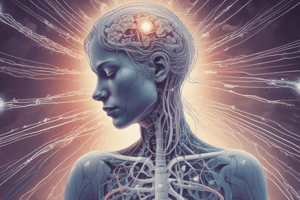Podcast
Questions and Answers
Chronic pain is linked to higher rates of ______ among the elderly.
Chronic pain is linked to higher rates of ______ among the elderly.
depression
The uncertainty about pain management can lead to heightened levels of ______.
The uncertainty about pain management can lead to heightened levels of ______.
anxiety
Pain can limit mobility, contributing to feelings of loneliness and ______.
Pain can limit mobility, contributing to feelings of loneliness and ______.
isolation
Persistent pain can affect concentration and memory, potentially leading to cognitive ______.
Persistent pain can affect concentration and memory, potentially leading to cognitive ______.
Chronic pain often disrupts ______ patterns, resulting in fatigue and reduced daytime functioning.
Chronic pain often disrupts ______ patterns, resulting in fatigue and reduced daytime functioning.
Engaging in low-impact activities such as walking or swimming can help maintain ______ and reduce pain.
Engaging in low-impact activities such as walking or swimming can help maintain ______ and reduce pain.
Applying heat pads or ice packs to affected areas is known as ______ therapy.
Applying heat pads or ice packs to affected areas is known as ______ therapy.
Incorporating anti-inflammatory foods, such as fruits and vegetables, can help manage ______.
Incorporating anti-inflammatory foods, such as fruits and vegetables, can help manage ______.
Flashcards are hidden until you start studying
Study Notes
Effects On Mental Health
- Increased Depression: Chronic pain is linked to higher rates of depression among the elderly.
- Anxiety: The uncertainty about pain management can lead to heightened anxiety levels.
- Social Isolation: Pain can limit mobility, contributing to feelings of loneliness and isolation.
- Cognitive Decline: Persistent pain can affect concentration and memory, potentially leading to cognitive decline.
Impact On Quality Of Life
- Mobility Limitations: Pain can restrict physical activity, leading to decreased independence.
- Sleep Disturbances: Chronic pain often disrupts sleep patterns, resulting in fatigue and reduced daytime functioning.
- Self-Care Challenges: Difficulties in performing daily activities can lead to reliance on caregivers.
- Emotional Well-Being: Constant pain can diminish overall life satisfaction and happiness.
Chronic Pain Management
- Multidisciplinary Approach: Involves healthcare professionals from various fields (physicians, psychologists, physiotherapists) to create a comprehensive pain management plan.
- Pharmacological Treatments: Use of analgesics, anti-inflammatory medications, and opioids, tailored to individual needs.
- Physical Therapy: Exercises designed to improve strength, flexibility, and endurance while reducing pain levels.
- Cognitive Behavioral Therapy (CBT): Techniques to manage pain perception and cope with the emotional aspects of chronic pain.
What They Do to Reduce Body Pain
- Regular Exercise: Engaging in low-impact activities such as walking or swimming to maintain mobility and reduce pain.
- Heat and Cold Therapy: Applying heat pads or ice packs to affected areas for relief.
- Mindfulness and Relaxation Techniques: Practices such as meditation, yoga, or deep breathing to cope with pain.
- Dietary Changes: Incorporating anti-inflammatory foods (e.g., fruits, vegetables, omega-3 fatty acids) to help manage pain.
- Complementary Therapies: Utilizing alternative methods such as acupuncture or massage therapy for additional pain relief.
Effects On Mental Health
- Chronic pain significantly correlates with elevated depression rates, particularly in the elderly population.
- Anxiety levels may rise due to ongoing uncertainties surrounding effective pain management strategies.
- Limited mobility caused by pain can lead to social isolation, exacerbating feelings of loneliness.
- Cognitive decline can occur as persistent pain negatively impacts concentration and memory capabilities.
Impact On Quality Of Life
- Chronic pain often results in mobility limitations, decreasing overall independence and functionality.
- Sleep disturbances commonly arise from chronic pain, leading to fatigue and a drop in daytime productivity.
- Increasing challenges in self-care can create a greater reliance on caregivers for daily activities.
- Continuous pain can lower emotional well-being and overall life satisfaction, affecting happiness levels.
Chronic Pain Management
- A multidisciplinary approach integrates various healthcare professionals, including physicians, psychologists, and physiotherapists, to formulate an effective pain management plan.
- Pharmacological treatments involve specialized usage of analgesics, anti-inflammatory drugs, and opioids, customized to match individual patient needs.
- Physical therapy programs focus on targeted exercises aimed at enhancing strength, flexibility, and endurance while minimizing pain.
- Cognitive Behavioral Therapy (CBT) provides techniques to alter pain perception and address emotional challenges associated with chronic pain.
What They Do to Reduce Body Pain
- Regular exercise, such as low-impact activities like walking or swimming, helps maintain mobility and alleviate pain.
- Heat therapy (heat pads) and cold therapy (ice packs) are employed for localized pain relief.
- Mindfulness practices, including meditation, yoga, and deep breathing exercises, assist in pain management.
- Dietary adjustments featuring anti-inflammatory foods—fruits, vegetables, and omega-3 fatty acids—support pain control.
- Complementary therapies like acupuncture and massage therapy offer additional strategies for pain relief.
Studying That Suits You
Use AI to generate personalized quizzes and flashcards to suit your learning preferences.




